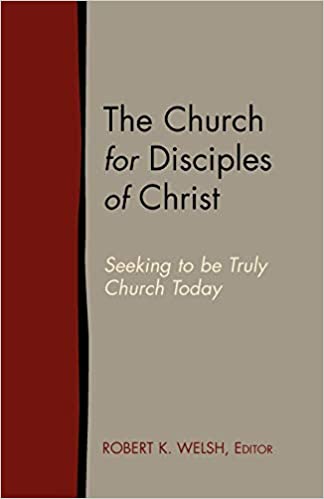You can also purchase a paperback copy from Amazon.com Click here to preview and order
This volume, originally published in 1998, edited by Paul A. Crow, Jr. and James O. Duke, includes the report of the Commission on Theology of the Council on Christian Unity that seeks to answer the most basic and all-embracing question facing the Christian Church (Disciples of Christ) today: “What do Disciples think it means to be church?” The beauty of “church” as experienced among the Disciples of Christ is that doing theology is not the domain solely of a “theology commission” but involves the whole church in all its expressions. That is why the reissue of this small volume becomes important to encourage all Disciples, clergy and laity alike, to wrestle with the basic questions raised in the Commission’s report.
Preface
An Invitation to Conversation
Disciples of Christ often have quoted the phrase, “In essentials unity, in opinions liberty, and in all things charity”—a verse not original with us—as one of those slogans that mark our identity as a movement and as a church. Sounds easy. But, the problem continues to reside in agreeing on what are “essentials” and what are “opinions.”
It was the stated task of our church’s Commission on Theology to sort out the “essentials” of what it means to be the Disciples of Christ that gave rise to the material included in this volume. As stated in the volume originally published in 1998, edited by Paul A. Crow, Jr. and James O. Duke, “In this report the Commission on Theology of the Council on Christian Unity seeks to answer the most basic and all-embracing question facing the Christian Church (Disciples of Christ) today: what do Disciples think it means to be church?”
For over 20 years (1979-1997) that Commission contributed biennial reports as “A Word to the Church” on what Disciples believe about the nature of the church, its witness, mission and unity, plus the questions of authority, ministry, baptism, and the Lord’s Supper.
This volume is a reissue of this material, The Church for Disciples of Christ: Seeking to be Truly Church Today, which sets forth a context of what “being church” is all about [Part 1: “Seeking to Be Truly the Church;” Part 2:“Lessons from Scripture and Tradition;” Part 3: “The Defining Signs of the Church’s Identity;” Part 4: “Issues of Relationship and Structure;” and, Part 5: the reports of the Theology Commission to the General Assembly of the Christian Church (Disciples of Christ).]
The beauty of “church” as experienced among the Disciples of Christ is that doing theology is not the domain solely of a “theology commission” but involves the whole church in all its expressions. That is why the reissue of this small volume becomes important. The Commission encourages clergy and laity alike to wrestle with the questions raised herein in local settings and discussions.
For instance, the Theology Commission in 1991 said the Lord’s Supper, which Disciples quickly recognize as central to their worship, preferably should come at the end of the worship service. Is that true in your congregation? Further, what is the role and relationship of the ordained minister to the elders at the Table? Is it appropriate for unbaptized children to take communion? See what the theology commission has to say about those matters.
And what about authority in the church? How does the church teach with authority? When, and under what circumstances, does the church speak with authority? The commission says Christ is always persuasive, never coercive. Among Disciples, authority is dispersed and shared, says the Commission. How does that play out in church life?
Since the whole people of God are called to share in mission, what are the appropriate involvements of the church in the struggle for justice and liberation? How do lay people minister to one another? Where is God calling us as Disciples today in mission and ministry?
It is my hope that this volume will spark renewed and fresh discussion across the life of our church, regarding the “essentials” of what it means to be church today! Only then will the tradition of theologizing among the rank and file of Disciples be perpetuated.
Those who served on the Commission represent some of the leading theologians of the Disciples tradition (listed below). Across the years the Commission was led by two chairpersons—H. Jackson Forstman (Vanderbilt University Divinity School) and James O. Duke (Brite Divinity School) –and guided by the vision of Paul A. Crow, Jr., my predecessor as Ecumenical Officer for the Christian Church (Disciples of Christ).
— Robert Welsh, president of the Council on Christian Unity

